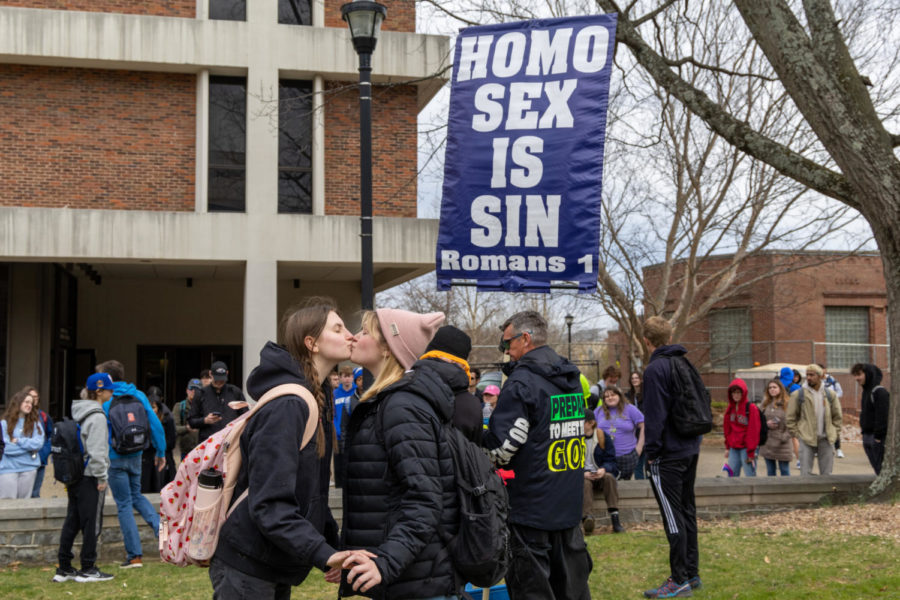Anti-LGBTQ evangelists spark controversy on campus
Kayla Walker, left, and Molly Godbey kiss during an anti-LGBTQ demonstration outside White Hall Classroom Building on Wednesday, March 8, 2023, at the University of Kentucky in Lexington, Kentucky. Photo by Travis Fannon | Staff
March 9, 2023
Two evangelists, who declined to give their names, attracted large crowds to the lawn by White Hall Classroom Building on Wednesday, March 8.
They held a sign that read “HOMO SEX IS SIN” on one side and “LIVE HOLY OR HELLFIRE” on the other while preaching their anti-LGBTQ religious beliefs to passersby for more than four hours.
“Homo sex is worse than murder,” one of the evangelists said. “If you don’t stop being a sinner you’re going to hell. Jesus would not turn water into wine for you kind of people. Jesus is the ultimate homo destroyer.”
This messaging sparked a protest from members and allies of the LGBTQ community, who began arguing with the speakers and waving pride flags and signs.
The protest started when Z Frizzell, a freshman geological science major, heard the evangelists say that transgender people are going to hell on their walk back from class around noon.
“As a queer, trans person, I was not comfortable hearing that. I walked up to them and was like ‘I am trans, why do I deserve to burn in hell for just trying to be myself?’” Frizzell said.
People noticed Frizzell challenging the evangelists and started to pitch in, questioning the evangelists beliefs and loudly chanting “love is love” and “gay sex.”
“I wish it could’ve been more of a conversation. But every time we tried to have a conversation, it devolved into them shouting back at us and not letting us talk,” Frizzell said. “So through that and other people seeing us and trying to advocate for themselves, people came to support.”
Frizell left the protest and came back with pride flags from their room. Many other students did the same, including Alex Nacke.
Nacke passed out handheld LGBTQ pride flags to protestors and waved an American flag featuring Nicki Minaj, a known LGBTQ supporter.
“I think it’s stupid as hell,” Nacke said. “I’m a Christian and I’m also trans and queer, so I just think it’s hateful for no reason. It’s something that the university does not need on its campus.”
Aly Petty, a sophomore at UK, also identifies as Christian and agreed with Nacke that the evangelists had the wrong approach to Christianity. Petty heard about the events occurring on Snapchat and rushed home to make a sign about how God loves all people before coming to the protest.
“I want people to understand that we don’t have a God of anger or one who we should be fearful of,” Petty said. “We have a God who loves people no matter where they are.”
Senior Blake Buis agreed that the focus of Christianity should be love, not hate.
“I don’t think spreading hate like this is very Christian, either because to me Christianity is all about love and acceptance,” Buis said. “I just don’t support them or what they’re saying at all.”
Not everyone who encountered the evangelists disagreed with their message. Computer science major David Webster supported the message but not the approach.
“I support the ‘against homosexuality.’ Our campus really needs that,” Webster said. “I think he could probably be a little bit nicer about it.”
Not much is known about the evangelists themselves. When asked what organization they were with, they responded, “the body of Christ.”
The younger of the two evangelists said that they have been to many college campuses before, including Eastern Kentucky University and the University of Tennessee, the state he said he is from.
He had a camera strapped around his waist, which he said was for “the crazy people” and “bad cops.” Onlookers expressed a suspicion that he was filming so if he was assaulted, he could receive financial restitution using the video evidence.
Protestors did not let the evangelists’ anti-LGBTQ+ message get them down.
“Spreading such a hateful message to young people is not good for the community that we’ve built, but I like seeing all the people coming together and spreading their message back at him,” freshman Emily Hightman said. “I think it’s powerful.”
Frizzell said the protest allowed them to connect with the LGBTQ community on campus and feel empowered.
“I am really proud of the amount of people that have joined us here. It means a lot to me that there are so many people willing to protest against people shouting hateful things about us and at us,” Frizzell said. “If they’re going to be loudly protesting my existence, then I’m going to be loud saying I’m allowed to be here.”































































































































































